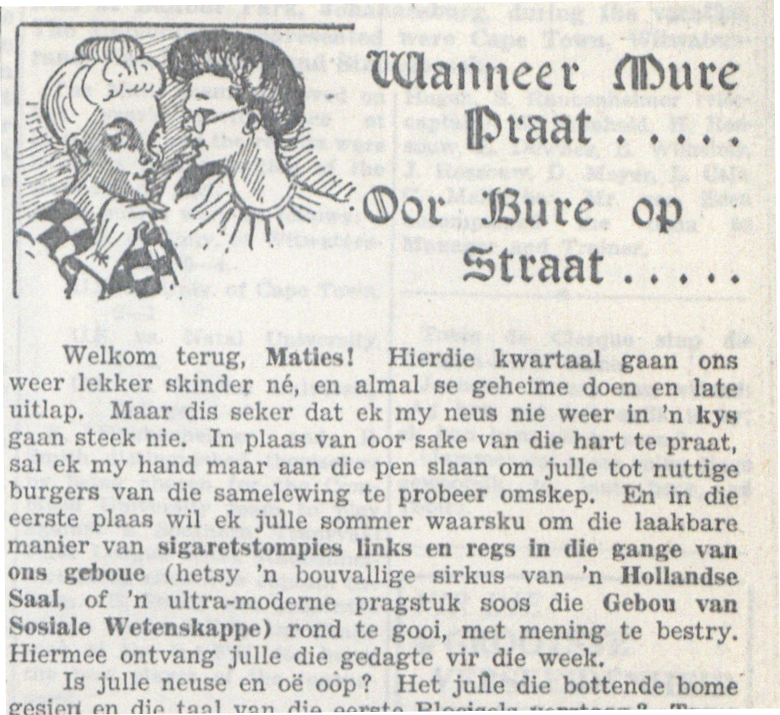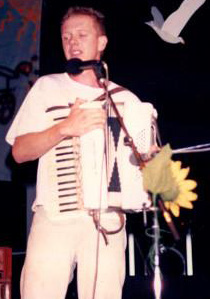BY TIAAN BOOYENS
Maties has a rich history of student activism and influential movements. As a young person who has the privilege of studying, will you be able to tell future generations that you played a part in shaping their world for the better? Or, will you have stood silent and remained complicit in the injustices of your generation?
Young people have always stood at the forefront of social change, whether they raised their fist among a crowd of protestors or shared movements on social media. Throughout history, students made their voices heard on the issues that impacted their generations. Die Matie has reported on the influence of student activism, and how student-led movements have developed over time.
“Minority Poor Black Unregistered Students”
Before 2021 had even reached its halfway mark, the Rooiplein had already been used as a stage for heated discourses on two notable causes. The first coincided with the majority of the Stellenbosch University (SU) student body’s tentative return to campus after almost a year in national lockdown due to Covid-19.
Some SU students experienced registration blocks due to historical debt. They were dubbed the “Minority Poor Black Unregistered Students” by this year’s SU SRC. The Minority Poor Black Unregistered Students then mobilised to call for action from the administration and solidarity from their peers.
Their protest on 17 March 2021 started on the famous red steps and led to students occupying the Neelsie student centre in an attempt to put pressure on the university. They demanded to be able to register at SU regardless of historical debt.
Student leader and activist, Alysa-Abby Kekana (third-year BA Drama and Theatre Studies), said that struggles are often overlooked by peers who do not share them. Kekana said that “it is critical for students to be involved [in student structures or organisations and] to not only [remain socially aware], but to stand in solidarity with those facing these issues.”
Fees Must Fall
SU Students participated in the Fees Must Fall movement on 12 September 2015, aimed at enabling more equitable access to tertiary education, that swept the nation. The SU library was occupied by protestors and academic activities in several other campus buildings, including active test venues, were disrupted. Nearly a week later, after continued protests, the SU administration announced that it would only be feasible to follow the national proposed increase of student fees in the following year. These protests sparked national discourse on the lasting inequity in South Africa that leads to unequal access to tertiary education.
SU Palestinian Solidarity Forum (PSF)
During a critical engagement of the SU Palestinian Solidarity Forum (PSF) on 18 May 2021, students flocked to the Rooiplein to wave the Palestinian flag and hold signs in support of the Free Palestine movement.
This gathering, among others that Die Matie has reported on in recent years, demonstrates how SU students involve themselves in activism towards causes that affect more than just their immediate community.
Black Lives Matter
The police brutality that led to the death of George Floyd in America on 25 May 2020 received rigorous media coverage all over the world. Many SU students all over South Africa, isolated during the hard lockdown at the start of the pandemic, shared their support for anti-racism movements such as Black Lives Matter and participatedin global conversations happening online.
Student activists, residences and student societies, who had only started relying on social media to promote their causes in recent years, mobilised mass followings to confront systemic racism in their immediate communities.
Gender Based Violence
After the death of Uyinene(Nene) Mrwetyana, University of Cape Town student in 2019, hundreds of SU students gathered on the Rooiplein steps. On 6 September 2019 SU students joined the large-scale protests against Gender Based Violence (GBV) across South Africa. Student activists of the Anti-GBV movement SU handed a six-page memorandum to university management with their demands for change. They played an integral role in cementing these issues as prioritised concerns for the university community.
#MeToo Movement
Maties have also participated in other international movements on social media over the years. Since October 2017, many individuals have stood in solidarity with the #MeToo movement. This was the movement behind American public figures like Tarana Burke and Alyssa Milano that publicised their allegations of sexual harassment and abuse.
#MeToo also helped to createawareness about sexual harassment in South Africa.
Global Climate Strike

JUSTICE Global Climate Strike on 20 September 2019. Photo: Tom Lee
SU students were among the protestors in front of Parliament on 20 September 2019. They marched in support of the Global Climate Strike, which was happening in cities from 150 countries around the world. Student activists like Greta Thunberg have created increasing awareness of the global climate crisis, which is caused by the emissions of fossil fuels and environmentally unsustainable practices.
Local student activists and SU societies like EcoMaties continue to promote ecologically conscious behaviour and initiatives. Anne Hall, student activist and member of EcoMaties said that students “have to start setting the standards for what we want for our future”.
“We have to stand up for what we stand on, because if not us, then who?” said Hall.
History of Student Activism
Given the rise of the student sentiment that “the personal is political”, it may seem as if universities have always been a fair ground to challenge social injustice. This, however, was not always the case.
SU banned protests on campus in 1985. Members of the 1990 SU SRC challenged repressive policies and won future Maties the right to organise legal protests on campus. It is thanks to the organisation and tenacity of student activists and leaders that a way was paved for the rise of student activism as we see it in our community today.
However, even then, student activism wasn’t a novel occurrence. SU students have always kept the energy to amplify their voices on deeper injustices of their time.
On 14 May 1986, 20 notable student leaders signed an open letter to the sitting South African President, P.W. Botha, demanding the legalisation of the African National Congress (ANC), then under the leadership of Oliver Tambo.
These student activists handed the letter over to the rector, Prof Mike de Vries, who told Die Matie (15 May 1986) that it was “a sign that the young people of today truly want to involve themselves and offer contributions to the shared future of South Africa”. He said contributions of students should also be aknowledged.



